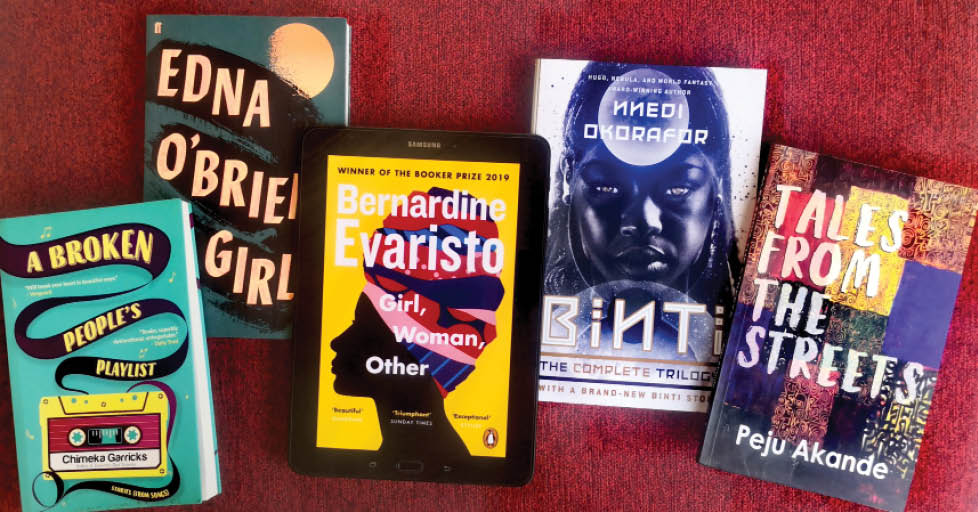I confess: Putting together a list of the best books published in 2020 – books which I’ve read – wasn’t easy. That’s mostly because I read many books, beginning from January, even as the number increased due to the Coronavirus-inspired lockdown and the oodles of time it availed many of us. Drafting my list, I also realized that the year has seen quite a number of stellar publications released, and in a wide variety of genres. Nigerian writers, too, represented very well and impressively, buoyed by the ongoing publisher renaissance of sorts. Fun fact? On my modest list of ten, four are from Nigerian publishers, while an additional two are by a Nigerian author, from a foreign publisher. You see the pattern there? Nigerian literature is growing. Ponder that, as I give you the second and final part of my list of the best books of 2022.
Girl, Woman, Other, by Bernardine Evaristo (Penguin Books)
It all seems straightforward and simple: It’s 1905 in Newcastle, England, and a ten-year-old Grace is haunted by an African father she has never met and possibly never will. Then fast-forward some stories later, to 2008 in Oxford, where Carole is rejecting her Nigerian background so she can snugly fit into an uppity new life in university. But these, and ten more stories, of a total of twelve people, all in Britain, populate the pages of Evaristo’s engaging, award-winning book for a purpose: They prove, almost clinically, that growth almost certainly comes from complex situations. Guided by the wit and style which the writer is now known for, I followed these people and their stories, and now I’m stuck with them. In the end, all of this book’s 453 pages seem not many enough.
- Nigerians celebrate peaceful, low-key Christmas amid COVID-19
- How prominent residents fled Kankara before attack
A Broken People’s Playlist, by Chimeka Garricks (Masobe)
Gripping me right from the poignant title, Garricks proceeds to weave story after story, some interlinked, some not. But all are quite enjoyable. Also noteworthy, is the way the titles of the stories are borrowed from actual hit songs of the past, like ‘Desperado’ by The Eagles, which the writer ‘owns up’ to writing under the influence of. Speaking of being under the influence, the stories offered up are positively demented in their twisted humour, and had me laughing out loud even when the story didn’t necessarily call for that. Maybe I’m broken. Or maybe it’s just the writer who needs help. Whatever it is, this is one excellent book.
Binti: The Complete Trilogy, by Nnedi Okorafor
Being a collection of Okorafor’s trio of incredibly evocative Binti novellas, it was a no-brainer that I had to snap it up upon release. The stories, set in an intricately-woven fantastical world, follow a powerful young woman on a journey to the unknown, and of a new life beyond all she’s ever known. Having read the first two before, I began from, well, the beginning. Even without the satisfying brand-new story – an extra for fans – reading the novellas sequentially made the stories I’d read before seem new. While Binti has been described before as ‘sexy’ and ‘edgy’ – and rightfully so – it is such an empowering tale, one which definitely rewards the reader in a variety of ways. For you to find out how, you will have to pick up the book. But if it’s easier for you, begin with ‘Binti’ and ‘Binti: Home’, published in Nigeria by Ouida Books, who are planning to release the third in 2021. Africanfuturism, the subgenre of sci-fi which Okorafor created, and which this is set in, is here to stay.
Tales From The Streets, by Peju Akande (Ouida/Tevani)
Nigerian literature, like I mentioned earlier, is undergoing a renaissance. This means all sorts of brilliance will be coming out to join, and add to, what came before. Akande’s book, a collection of stories – vignettes, really – are based on true stories, taken from the streets, just as the title implies. But are they really true? My not knowing if they’re drawn from reality or from a fertile imagination makes them more appealing. The presentation, headlined by screaming sensational titles add to their charm. But the real draw, for me, is the writer’s voice, even though she pens the stories in first-person narrative format. Mostly set in Lagos, with a sprinkling of other locations, Akande’s stories are as much about parallels like life and death, laughter and tears, hope and despair, as they are about the grey areas between them. And that’s one of the reasons I enjoyed them so much.
Girl, by Edna O’Brien (Faber & Faber)
O’Brien has more than twenty works of fiction to her name, and I treated the announcement of ‘Girl’ in late 2019 lukewarmly. But when it was re-issued in July 2020, I caught a little detail: It’s based on the narration of one of the Chibok girls, tragically famous Nigerian schoolgirls kidnapped by the bloodthirsty terrorist sect Boko Haram. Having read a good deal of their stories in real-time on account of my being a newspaper editor when the incident broke, as well as years after, I subconsciously harbored the notion that nothing new could be written about them. Was I wrong! O’Brien’s book takes a tender, almost lyrical look at one of the girls, and in a respectful way. It’s as beautifully a written story, as the harrowing experiences it’s based upon, and I strangely found it otherworldly, and human at the same time.

 Join Daily Trust WhatsApp Community For Quick Access To News and Happenings Around You.
Join Daily Trust WhatsApp Community For Quick Access To News and Happenings Around You.


